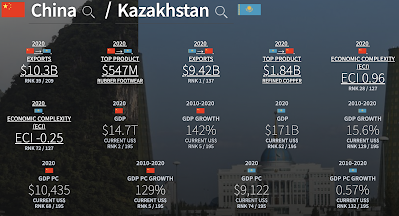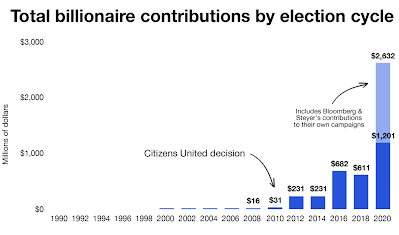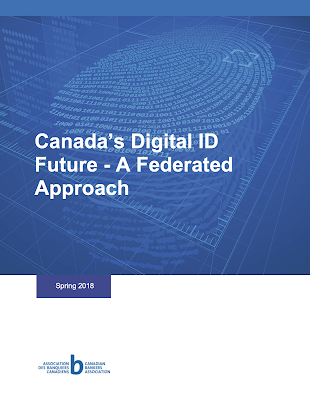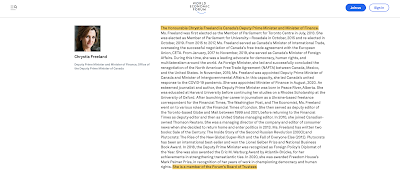While the world is distracted by the ongoing conflict in Ukraine, the global geopolitical theatre continues to involve. On April 25th, 2022, Kazakh President Tokayev met with visiting Chinese State Councillor and Defense Minister Wei Fenghe in Nur-Sultan, the capital city of Kazakhstan.
As you can see on this map, Kazakhstan shares a lengthy border with both China and Russia:
Kazakhstan has a significant trade relationship with China as shown here:
Here is a graphic showing Kazakhstan's trading relationship with China in both exports and imports as shown here:
Exports from Kazakhstan to China rose by 58 percent between 2015 and 2019 and 13.6 percent of Kazakhstan's total exports end up in China. Exports from China to Kazakhstan rose by 52 percent between 2015 and 2019. Between 2016 and 2019, China became Kazakhstan's fastest growing export market, growing by 87 percent over the time period.
Here are China's top imported and exported goods from/to Kazakhstan in 2019 and the share of each:
Imported from Kazakhstan:
1.) Mineral fuels and oils and bituminous substances $2.934 billion - 32 percent share
2.) Copper - $1.738 billion - 19 percent share
3.) Ores, slag and ash - $1.634 billion - 18 percent share
4.) Iron and steel - $908.7 million - 10 percent share
5.) Inorganic chemicals, precious metals, rare-earths - $869.3 million - 9 percent share
Exported from China:
1.) Machinery, mechanical appliances, nuclear reactors - $1.564 billion - 12 percent share
2.) Electrical machinery and equipment - $1.498 billion - 12 percent share
3.) Clothing and apparel not knitted - $1.438 billion - 11 percent share
4.) Footwear - $970.3 million - 8 percent share
5.) Clothing and apparel knitted - $897.4 million - 7 percent share
Since 2012, China has been the largest buyer of Kazakhstani uranium, an important element for China's growing nuclear reactor fleet.
Now, let's look at the most recent news that connects the two nations together as I noted above from the Ministry of National Defense of the People's Republic of China website keeping in mind the near coup/uprising that took place in Kazakhstan in early January 2022:
Here is a translation of the news release courtesy of Google Translate with my bolds:
"Tokayev (Kazakhstan's President) said that Kazakhstan and China celebrate the 30th anniversary of the establishment of diplomatic relations this year. Over the past 30 years, Kazakhstan and China have become permanent comprehensive strategic partners. The two countries have maintained high-level cooperation in the international political arena and achieved remarkable results in cooperation in various fields. In recent years, I have frequently interacted with President Xi Jinping, which has brought strong impetus to bilateral relations. I believe that bilateral relations will achieve greater breakthroughs and achievements. Kazakhstan attaches great importance to the military cooperation between the two countries, and hopes that the two militaries will continue to strengthen practical cooperation in peacekeeping operations, joint exercises, personnel training, military technology and other fields.
Wei Fenghe said that His Excellency the President is an old friend of the Chinese people and has made outstanding contributions to the establishment and development of China-Kazakhstan permanent comprehensive strategic partnership. This year marks the 30th anniversary of the establishment of diplomatic relations between China and Kazakhstan. Under the strategic guidance of the two heads of state, the bilateral relations have maintained a vigorous momentum of development with bright future prospects, becoming a model of good-neighborliness and friendship, mutual benefit and win-win results."
Here are the key sentences, aimed directly at Washington:
"China firmly opposes external forces deliberately instigating a "color revolution" in Kazakhstan, and supports Kazakhstan in taking effective measures to safeguard national security and social stability. We must be alert to some major powers interfering in Central Asia and disrupting the security of Central Asia. This visit reflects China's great importance and firm support to Kazakhstan. No matter what kind of risks and challenges they encounter, China and Kazakhstan will jointly safeguard regional stability and promote the building of a community with a shared future for mankind."
Here are the closing sentences of the press release:
"In recent years, the exchanges and cooperation between the Chinese and Kazakh militaries in various fields have been fruitful. The Chinese military is willing to continue to expand cooperation areas with the Kazakh side and promote the in-depth development of the relationship between the two militaries.
On the same day, Kazakh Defense Minister Zakserekov held a welcome ceremony for Wei Fenghe and held formal talks. The two sides exchanged in-depth views on the international and regional security situation, the situation in Ukraine, and the Afghan issue, and agreed to continue to strengthen strategic communication between the two militaries, conduct joint exercises and training, and carry out practical cooperation."
With Kazakhstan playing a very important part in China's ongoing economic development thanks to its abundant reserves of crude oil (the twelfth largest oil reserves in the world) and its world leading uranium production capabilities as shown here:
...it is very apparent why China is making diplomatic moves to strongly discourage Washington from further geopolitical maneuvering in Kazakhstan in its efforts to solidify America's position as the sole global superpower. Kazakhstan stands to play a very important role in China's future, particularly its energy security, and the current leadership of China are not about to stand by while Washington meddles further in the affairs of Central Asia.





























